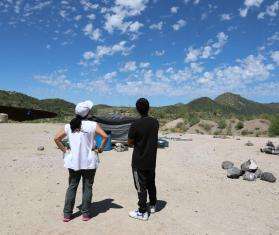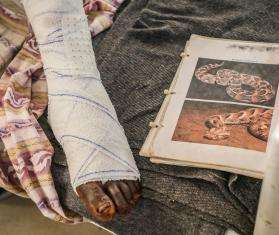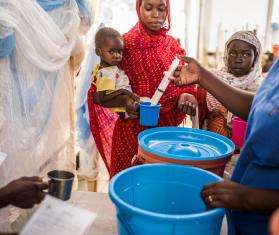NEW YORK/PARIS, August 23, 2024— The Lancet Infectious Diseases published a study this week by Epicentre, Doctors Without Borders/Médecins Sans Frontières' (MSF) research arm, which found that vaccinating people against Ebola during epidemics reduces their risk of developing the disease by 84%. These results reinforce the importance of rapidly vaccinating people potentially exposed to the Ebola virus as soon as epidemics begin.
The study was funded by MSF and conducted in collaboration with the Institut National de Recherche Biomédicale (INRB) and the Democratic Republic of Congo’s (DRC) Ministry of Public Health. It analyzed data collected during the largest Ebola epidemic recorded in DRC—between 2018 and 2020—in which 3,470 cases and 2,287 deaths were reported. It The study looked at the rVSVΔG-ZEBOV-GP vaccine in particular, which is manufactured by Merck and is the only Ebola vaccine recommended for use by the World Health Organization for people at high risk of contracting the disease during an epidemic.
"This study dispels uncertainties about the vaccine's actual effectiveness," said Sophie Meakin, epidemiologist with MSF’s Epicentre. “This is the first published study to evaluate the effectiveness of the rVSVΔG-ZEBOV-GP vaccine outside of a clinical trial.”
Designed to be administered in a single dose, it is recommended primarily for ring vaccination. Ring vaccination is a strategy that targets the contacts and contacts-of-contacts of confirmed Ebola cases, as well as health care and frontline workers who are at high risk of exposure. During the 2018-2020 Ebola epidemic in DRC, vaccination began in August 2018 and over 300,000 people were vaccinated. This epidemic was the second largest on record, after a 2014-2016 outbreak in West Africa during which no vaccines were approved for use.
The study showed vaccination with rVSVΔG-ZEBOV-GP offered high protection against contracting Ebola starting 10 days after vaccination. Vaccine effectiveness was estimated by comparing Ebola PCR test positivity rates between vaccinated and unvaccinated people. All of them had reported contact with someone infected with Ebola and had been tested by PCR at health care facilities to confirm whether or not they were carrying the disease. Results found that vaccination reduced the risk of developing the disease by 84% after 10 days, with the vaccine being 80% effective for women and 86% effective for men.

"These are unique opportunities to deepen our knowledge of often rare diseases, and thus improve the management of future epidemics, develop new control tools, and determine the best strategies for using them effectively," said Steve Ahuka, head of virology at INRB and medical professor at the University of Kinshasa.
Another MSF study published earlier this year found that being vaccinated with rVSVΔG-ZEBOV-GP—even after being exposed to the Ebola virus—can cut mortality figures of those infected in half.




